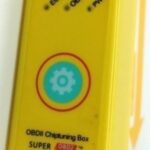As a Fiesta ST owner eager to enhance my car’s performance, I turned to the Diablosport Intune i3 tuner. Having used Diablosport products before on other vehicles, and noticing they offered Ford licenses, I figured I’d try their 91 Octane tune on my low-mileage 2016 Fiesta ST. My experience, however, quickly turned sour, highlighting potential issues and raising questions about using performance tuners as OBD2 diagnostic tools in certain situations.
Initially, installing the canned 91 octane tune seemed straightforward. However, it didn’t take long for problems to surface. The tune immediately triggered two error codes: PCM0C00 (Drive Motor A Current) and PCM3400 (Cylinder Deactivation Malfunction). These codes seemed perplexing and unrelated to typical engine tuning issues on a Fiesta ST. More concerning was the car entering a noticeable ‘limp mode,’ drastically reducing power and feeling like zero turbo boost. The check engine light (CEL) and service soon light illuminated, adding to the alarm. Cycling the engine on and off temporarily cleared the limp mode, but the underlying problem remained.
Seeking a solution, I logged the data and contacted Diablosport support. To their credit, they attempted to resolve the issue by providing a custom tune. Unfortunately, this custom tune yielded the same error codes and limp mode activation. The problem seemed to consistently occur under Wide Open Throttle (WoT) or when exceeding 6000 RPM. After further logging and communication, Diablosport suggested updating the Intune unit itself, rather than providing another custom tune iteration.
Following their advice, I updated the Diablosport Intune. Regrettably, this update also failed to resolve the limp mode issue. Instead, it introduced a new error code: PCM:C0200 (ISO/SAE Reserved). At this point, my confidence in using the Diablosport Intune for performance tuning on my Fiesta ST was severely diminished. I decided to revert to the stock tune, using the Intune solely to adjust the tire size for my aftermarket 215/40/17 tires – a function similar to a basic OBD2 scanner’s calibration capabilities, but a far cry from the promised performance enhancements.
While Diablosport offered to continue troubleshooting, my primary goal was ease of use and reliable performance gains from a canned tune. The persistent issues and troubleshooting process defeated this purpose. Consequently, I opted to request a refund from Diablosport and explore alternative tuning solutions, specifically considering Mountune and Cobb, which are more prevalent and trusted within the Fiesta ST community.
Diablosport’s support team acknowledged the issue but couldn’t pinpoint the exact cause, stating it didn’t appear to be a widespread problem across all Fiesta STs. However, the limited adoption of Diablosport within the Fiesta ST community makes it difficult to verify this claim. My personal experience suggests caution when considering Diablosport Intune for tuning this platform, especially when compared to using a dedicated OBD2 scanner for diagnostics versus expecting seamless performance tuning. For Fiesta ST owners, established and community-supported tuning solutions might offer a more reliable path to performance upgrades, avoiding potential headaches and unexpected limp modes.
